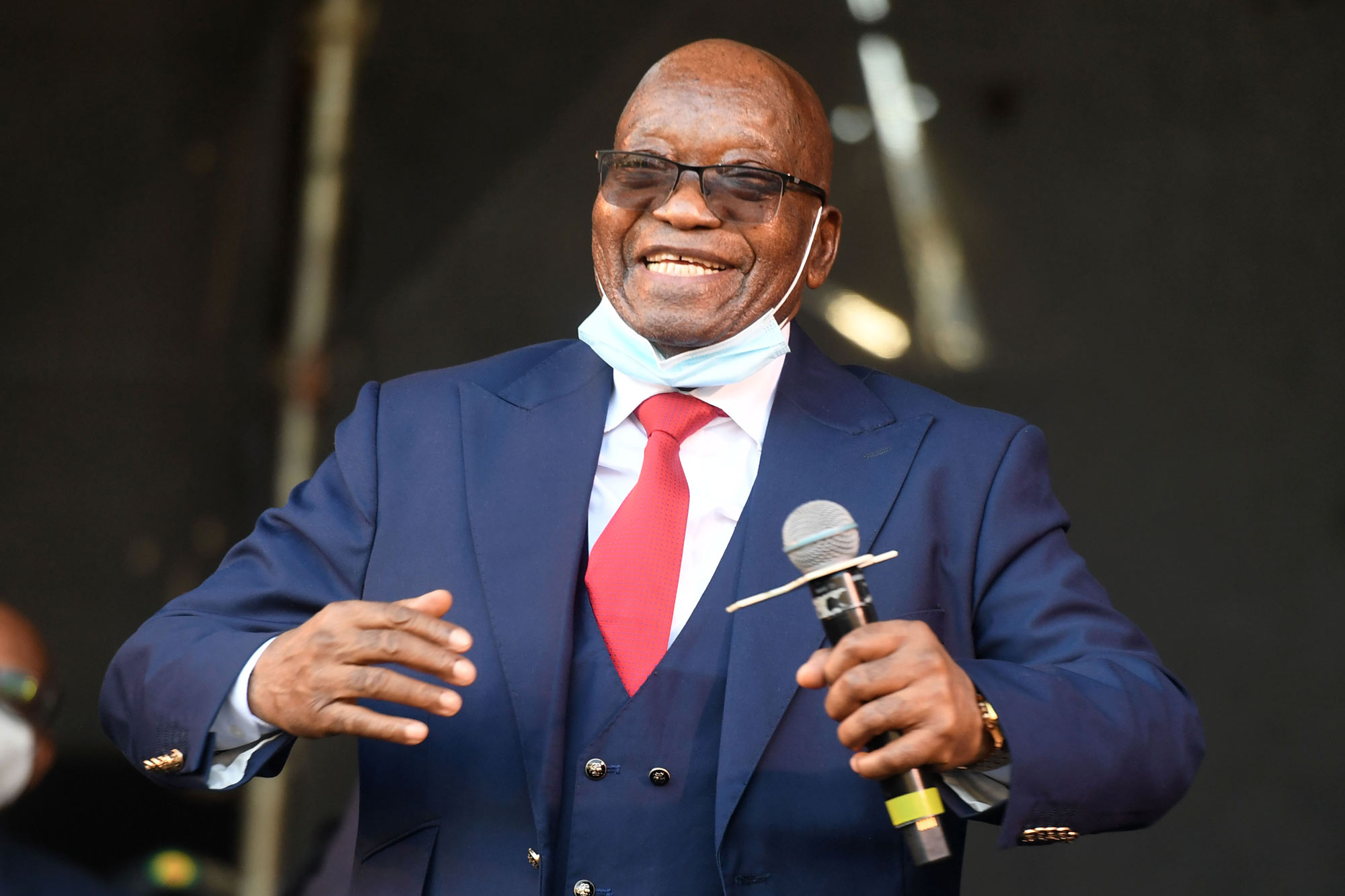Tyres burn as road runs out for Zuma
Jacob Zuma is finally having his day in court. But while there is deep popular opposition to corruption, the criminal justice system requires urgent reform if it is to sustain credibility.
Author:
28 May 2021

Jacob Zuma finally appeared in the high court in Pietermaritzburg this week on charges of corruption, racketeering, money laundering, fraud and breaches of the Income Tax Act. This week also saw revolt in Makhanda and Harrismith. Protests shut down Bloemfontein last week. Corruption and its consequences were central to this protest action around the country.
There is a direct link between the ANC’s rush into a full-blown kleptocracy under Zuma – a violently repressive kleptocracy – and the ubiquity of local protests, which have been common since 2004. The same political system that produces a vast accumulation of riches for the political class produces the rapid degradation of infrastructure and municipal service provision for the majority, and the literal stench of corruption in the form of sewage in the streets and uncollected refuse rotting in the sun.
Protests across North West province in 2018 forced the removal of Supra Mahumapelo from office. It is not impossible that a moment could come in which a spark lit in one neighbourhood jumps to another, and then others, resulting – much like during the early moments of the Arab Spring – in protests that occupy central urban spaces, forge direct connections between people from different areas, and carry a clear and compelling demand on to the national stage.
Related article:
But with no nationally significant elites interested in forging a sustained alliance with popular disgust and rage at corruption, the elite public sphere looks largely to internal contestation and processes inside the ANC and the criminal justice system for a way out.
The fantasy that the Thuma Mina faction of the ANC would swiftly sweep away the radical economic transformation (RET) faction with all its rot and hypocrisy did not survive the looting of funds dedicated to the Covid-19 pandemic, or the all too evident reality that many key figures in Cyril Ramaphosa’s camp are just as deeply compromised. The steps taken against Ace Magashule are encouraging, but they can hardly be seen as the beginning of a comprehensive solution when compromised people such as Gwede Mantashe and Zweli Mkhize remain central to the ANC.
Politics, not law
In this context, the appeal of the idea that an autonomous and efficient prosecuting authority acting without fear or favour can bring solid cases to the courts is understandably attractive. The successful prosecution of a number of powerful public figures across factional and party divides, and including corporate rogues, could mark an end to the brazen impunity long granted to elites. This would be entirely welcome.
But as has been widely noted, the challenges that would need to be overcome before this could be achieved do not simply pertain to the capacity of the prosecuting authority. The RET faction of the ANC and its new allies in the EFF have shown that they will contest attempts at prosecution in political rather than legal terms. Zuma’s decision to add Dali Mpofu to his defence team – a lawyer known for his capacity for increasingly crass political theatre rather than legal acuity – has made this crystal clear.
Related article:
The RET faction does not have any significant popular support and the EFF’s electoral support remains relatively small. But with the ability to effectively manipulate social media, and a mainstream media compulsively attracted to political celebrity and the politics of spectacle, it is not difficult to imagine a situation in which numerically small but well organised groups achieve an outsize influence in the public sphere.
We have already witnessed the EFF unscrupulously inciting anti-Indian sentiment to delegitimate the anti-corruption currents in the ANC as well as the prosecuting authority. But spin does not only have to be based on fabrication and the cultivation of crude prejudices.
The spin machine
Law professor Pierre de Vos has noted that the spin machine has a lot with which to work. It is outrageous that Markus Jooste, the former Steinhoff chief executive facing charges of misconduct, and those who murdered and tortured for apartheid but did not seek amnesty from the Truth and Reconciliation Commission have not been prosecuted. If senior politicians allied to Ramaphosa are not prosecuted, allegations of factional bias will appear credible.
A criminal justice system that can be presented as politically partisan is vulnerable to organised attempts at delegitimation. To avoid this, action would not only have to be taken against apartheid and corporate criminals, but there would also have to be rigorous investigation and, where necessary, prosecution of politicians allied to Ramaphosa. It may well be that this is simply not politically viable in the ANC.
Related article:
Given all this, it seems that in the absence of significant organisation of the widespread public support for action against corruption, a project to oppose kleptocracy and undo elite impunity is unlikely to be effective or able to be carried out without incurring severe damage to the judiciary. In other words, there needs to be a mass-based political project, a democratic political project rather than a narrow intra-elite project, to oppose corruption – one that can constitute itself as both a material force and an effective protagonist in the battle of ideas.
The imperative for organised, mass-based political opposition to corruption requires a much deeper critique of the criminal justice system than that usually developed in the elite public sphere.
Shaped by class
Anyone who has spent time in the magistrates’ courts will know how profoundly class shapes their day-to-day functioning. When a person without money is brought into the dock from the cells, something as important as a bail application can be over in a couple of minutes, with the prosecutor and the legal aid defence lawyer quickly scanning the relevant documents for the first time during that brief appearance. There is a shameless lack of regard for most who pass through the system.
But when a person with money is brought into the dock, the whole system slows and careful consideration is given to evidence, law and process. With a good advocate acting for an accused, a bail application can take hours. People get the consideration and justice for which they are able to pay. And then there is the profound corruption in the system, with often open demands by the police for bribes at various points in the process.
But the criminal justice system is not just pervasively corrupt, pervasively cruel and pervasively contemptuous of impoverished people. It has also been captured by local political elites to harass activists. This is a phenomenon that predates the Zuma years, and one that has continued under Ramaphosa.
Related article:
State violence against impoverished people and assassinations of activists are seldom investigated, let alone prosecuted. Brazenly illegal forms of state violence, such as the use of live ammunition against unarmed people during illegal evictions, are glossed over. Activists are routinely arrested on trumped-up charges, sometimes jailed for long periods, and then made to appear in court six or seven times before spurious charges are finally dropped.
Turning popular opposition to corruption into an organised political force on a national scale requires committed day-to-day work by grassroots activists – the same people who are subject to routine harassment from the police, prosecutors and courts.
Shack dwellers’ movement Abahlali baseMjondolo, an organisation now more than 100 000 strong, was at the offices of the National Prosecuting Authority (NPA) in Johannesburg last week, protesting against the harassment of their activists by the criminal justice system. This is an organisation that has always opposed corruption and paid a high price for that commitment, a price that has included numerous arrests, regular state violence – including torture – and a number of assassinations. The fact that it simultaneously protests against corruption and the NPA is significant.
Related article:
No political systems, institutions or actors can expect popular support from society when they do not function in the interests of society. The reform of the criminal justice system needs to dig much, much deeper than is usually understood. Reform cannot be solely a matter of ending impunity for elites.
Apparently corrupt people, including Zuma, should be fairly and rigorously investigated and, if the evidence leads in that direction, charged, prosecuted and sentenced. At the same time, the criminal justice system must be decommodified to ensure equal consideration and fairness to all, and its capture by local political elites to harass grassroots activists brought to a swift and decisive end.





